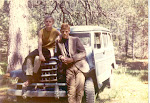
[Strangely, this blog is first though it should be the last]
Finally, we come to the End. Is it truly the End Times or is there hope for our humanity? Is there hope for the Late Age of Print, our technological predecessors and the Book? How can we as writers and authors make creative and intellectual use of this new medium, the World Wide Web and the Age of Technology? At the end of Bolter’s book he discusses “writing the self.” The dichotomy of the mind and body mirrors the division of nature and technology. Suddenly, writing of the self is not just about the written word bound and twined with a spine but it is about the visual creation and utilization of a new and intangible medium. According to Bolter, “the electronic technology can free human discourse and even human interaction from the body” (201) therefore, we have come full circle with the (written) freedom of voice and choice. We are in a phase theorists have deemed the Postmodern Era; for Bolter and his concepts of hypertext we are creating and experimenting with our “electronic selves” (203). The internet exists as not only an omnidirectional means of communication but also a way for us to “rewrite our culture” (204). As our knowledge mutates and grows we are both destroying and creating parts of our humanity. We venture into the abyss in hopes that we can retreat when needed. Maybe we will destroy ourselves in the process of progress; maybe we already have. But if we implode ourselves will not books go up in the flames anyways? Print is not dead. God is not in the machine. The only thing we can do now is watch, wait and keep writing in any fashionable way we chose. Viva la pluma!
Finally, we come to the End. Is it truly the End Times or is there hope for our humanity? Is there hope for the Late Age of Print, our technological predecessors and the Book? How can we as writers and authors make creative and intellectual use of this new medium, the World Wide Web and the Age of Technology? At the end of Bolter’s book he discusses “writing the self.” The dichotomy of the mind and body mirrors the division of nature and technology. Suddenly, writing of the self is not just about the written word bound and twined with a spine but it is about the visual creation and utilization of a new and intangible medium. According to Bolter, “the electronic technology can free human discourse and even human interaction from the body” (201) therefore, we have come full circle with the (written) freedom of voice and choice. We are in a phase theorists have deemed the Postmodern Era; for Bolter and his concepts of hypertext we are creating and experimenting with our “electronic selves” (203). The internet exists as not only an omnidirectional means of communication but also a way for us to “rewrite our culture” (204). As our knowledge mutates and grows we are both destroying and creating parts of our humanity. We venture into the abyss in hopes that we can retreat when needed. Maybe we will destroy ourselves in the process of progress; maybe we already have. But if we implode ourselves will not books go up in the flames anyways? Print is not dead. God is not in the machine. The only thing we can do now is watch, wait and keep writing in any fashionable way we chose. Viva la pluma!








